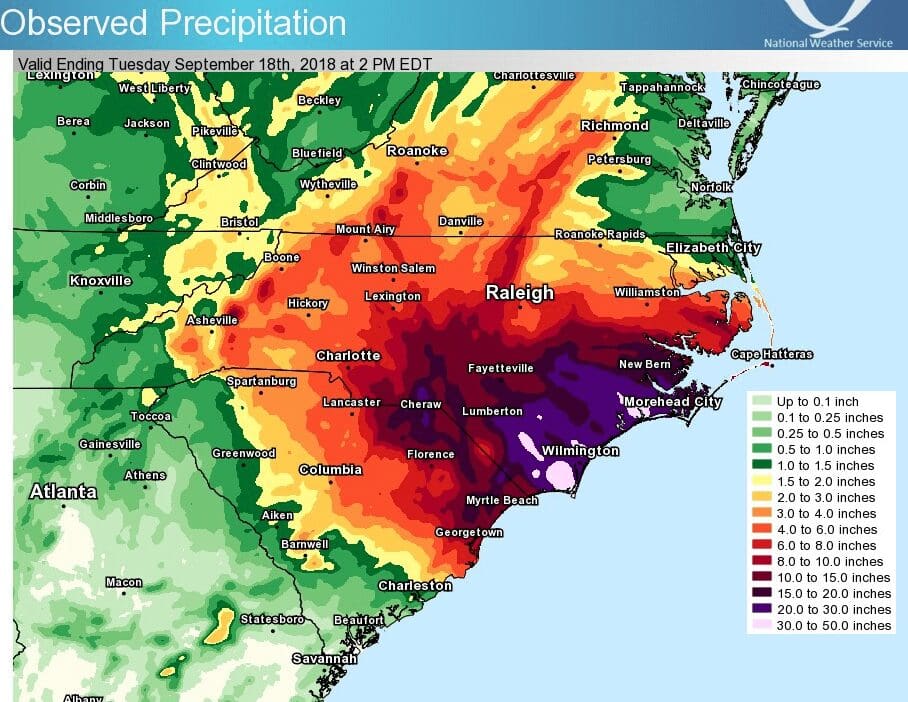
As North Carolina and our nation take steps to mitigate the effects of COVID-19 while preparing for hurricane season, our ability to be resilient and recover will be tested like never before.
WithersRavenel is ready to assist local governments, Councils of Government and other public and private organizations throughout our state. The front line of our experience with resiliency and recovery work for communities is through our work with the Southeastern Economic Development Commission, (SEDC) the economic development district for southeastern NC.
Following Hurricane Matthew’s devastating impact on North Carolina in 2016, WithersRavenel began working with SEDC to assist with the facilitation of disaster recovery efforts. Based in Elizabethtown, the Commission includes 12 counties: Bladen, Brunswick, Columbus, Cumberland, Harnett, Hoke, New Hanover, Pender, Richmond, Robeson, Sampson and Scotland.
How WithersRavenel helps
We help SEDC and its member communities with a variety of services. The initial work after Hurricane Matthew focused on assisting a select number of communities as nominated by COGs. Activity centered around identifying priority issues to assist communities with moving from rebuilding to recovery and resiliency in the following sectors: Housing, Infrastructure, Business Development, Environment/Natural Resources/Agriculture, and Public Health and Well-being. Scope of service initially included providing assistance with grant writing.
Following Hurricane Florence in 2018, we opened services to any and all communities in the jurisdiction. Much of the focus has been on applications for the EDA Disaster Supplemental funding availability, but the one-on-one work with communities identified other areas to address to enhance recovery and resiliency efforts, including critical water, wastewater, and stormwater needs.
WithersRavenel assists numerous communities in the SEDC jurisdiction. We’ve helped Dunn and Lillington acquire Golden LEAF grants to assess and improve wastewater systems. We’re secured grant funds for Autryville and Turkey to assess and repair stormwater infrastructure. Clinton received funding to repair its levee protecting its wastewater treatment plant. Cumberland County is pursuing grants for debris cleanup on the Little River. Additionally, Burgaw, Leland and Whiteville applied for planning grants that would enhance their downtowns. And we’re working with other communities and communicating with state agencies to identify resources and address resiliency and recovery priorities.
We also work with the SEDC to update its website, which is a clearinghouse for vital information on disaster recovery, grants and other topics. The site also currently includes a portal with links to information for businesses and local governments on COVID-19. Visit the website at sedcnc.org.
Think resiliency, be prepared
With hurricane season off to a quick start, the state of North Carolina is focused on resiliency. The recently-released Climate Risk Assessment and Resilience Plan aims to address the state’s vulnerability to climate change. Moreover, the plan calls for action and identifies problems the state needs to address to better prepare for a warmer, stormier future. Click here to read or download the state plan.
Additionally, all Cabinet agencies are integrating climate adaptation and resiliency planning into their programs and policies.
WithersRavenel applauds the state’s initiative and is ready to work with communities to become more resilient. It’s imperative that everyone in North Carolina works together. To put our company to work for your town, city, county or region, contact Bob Taylor at btaylor@withersravenel.com. We look forward to helping your community navigate a future with many bright days on the horizon.
